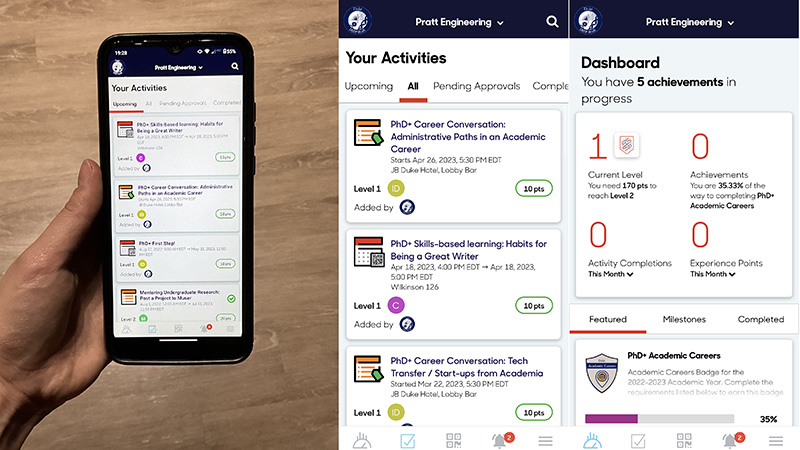Duke Engineering’s Revamped PhD Plus Program Helps Steer Students’ Career Paths
By Ken Kingery
Focusing on a different career path each year helps engineering PhD students decide which to follow after defending their dissertation

It’s commonly assumed that most engineering PhD students have a good idea of what they want their career trajectory to look like. After all, earning a PhD is a long and rigorous process that practically guarantees repeated failures.
But that assumption is wrong.
“Based on our statistics, more than 70 percent of our incoming PhD students each year aren’t sure what they want to do with their degree,” said Aaron Franklin, the Addy Professor of Electrical and Computer Engineering at Duke Engineering and the school’s associate dean for doctoral education. “And within the remaining 30 percent, many will end up changing their minds. We knew we needed to do a better job of providing them with a clearer picture of what their options are.”
“Based on our statistics, more than 70 percent of our incoming PhD students each year aren’t sure what they want to do with their degree. We knew we needed to do a better job of providing them with a clearer picture of what their options are.”
aaron franklin | Associate Dean for Doctoral Education
To put that picture into 4K, Franklin led an overhaul of Duke Engineering’s PhD Plus program, which launched in the fall semester of 2022. The previous version of the program was completely student-led and student-run, and—according to current PhD students—lacked consistency as well as an overarching strategy. While the new version of the program is led by Duke Engineering administrators, it still gets a lot of input from an eight-student advisory board.
“Each event used to be announced a week beforehand or less, which can be really challenging for a PhD student’s schedule,” said Luisa Piccolo Serafim, a second-year mechanical engineering PhD student who serves on the advisory board. “The new organization is the main difference in how the program operates now, and it’s the key to why it’s way better than it used to be.”
In the new format, PhD Plus spends an entire year focused on one of three potential career trajectories—academia, industry or government lab research, and entrepreneurship, law or consulting. Because the focus rotates each year and an average PhD takes almost twice as long to complete, students get ample opportunities to learn about each, no matter when they begin their studies.
“Having an app to use may seem like a small thing, but it makes these events a lot easier to market to students.”
Faris Albarghouthi
Events are prescheduled on a standard, recurring basis so that students can plan well in advance to attend. Each event is tailored toward one of seven core competencies and include workshops, career conversations, skill-based learning sessions and career-themed courses, among others. Students can work toward earning a certificate by attending a certain combination of events, or they can just show up for a few events now and then.
If it sounds like a lot for students to keep up with, don’t worry — there’s an app for that. Sortable event schedules, attendance records, and progress made toward badges and swag awards are all kept at the students’ fingertips through an app powered by Suitable.
“Having an app to use may seem like a small thing, but it makes these events a lot easier to market to students,” said Faris Albarghouthi, a fourth-year ECE PhD candidate who serves on the advisory board. “A lot of times PhD students get bombarded with emails about events, and it gets easy to get into a routine of ignoring them. Having an app that sends you notifications and reminders without being too intrusive or complicated makes a big difference in engaging students.”
“This year’s program has helped me build a network here at Duke. I’ve gotten to interact with a lot of different faculty members and really understand what the process is like, where before I didn’t know much at all about the steps that you need to take. It’s been incredibly helpful for me.”
Pablo Cordero
By all accounts and metrics, the approach seems to be making a difference. Whereas the previous iteration of the program engaged perhaps 10 percent of students, the first year of the revamped program has attracted more than 30 percent of students to at least one of the year’s 15 events.
And Franklin expects that number to rise. To help simplify the first year, the program focused on academia and largely relied on Duke faculty for the presentations and events. When next year focuses on industry and government lab research, almost all the speakers will come from outside of the school, which should lend to a more exciting atmosphere. Not that the academia-focused track hasn’t been an overwhelming success.
“Everyone I’ve talked to, my friends in the program here at Pratt, it’s very popular,” said Albarghouthi. “They’ve all said the same thing, that it’s been a super insightful experience.”
“You can tell by the level of engagement at events,” added Piccolo Serafim. “It takes a minute for the questions to start coming, but once they do, it doesn’t take long for the students to pick up steam and pick the speakers’ brains.”
“I was working in industry and came back to get my PhD to be a faculty member in academia,” said Pablo Cordero, a second-year BME PhD student who serves on the advisory board. “This year’s program has helped me build a network here at Duke. I’ve gotten to interact with a lot of different faculty members and really understand what the process is like, where before I didn’t know much at all about the steps that you need to take. It’s been incredibly helpful for me.”
